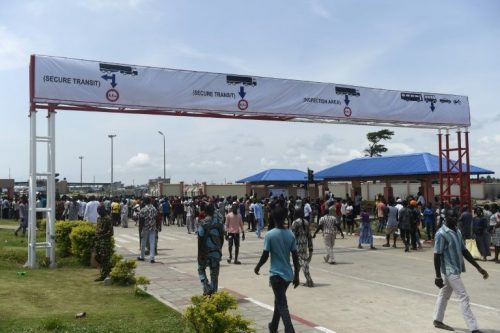The West African Association for Cross Border Trade in Agro-Forestry-Pastoral, Fisheries Products and Foods (WACTAF)) Nigeria Chapter, has called on the Economic Community of West African States (ECOWAS) Commission to intervene with the Nigerian government over its land border closure.
Traders, manufacturers and business owners have continued to count their losses and are near collapse in the last six months over the decision of the government to shut the nation’s land borders with West African neighbours.
Second Regional Secretary of the Association, Salami Alasoadua, who spoke in a chat with SHIPS & PORTS, appealed to the Federal Government to re-consider its decision on the partial closure of the land borders especially as most of their agricultural products are rotting away.
He said the association, disturbed by the plight of members, had gone on a fact finding mission at Seme and discovered that traders are losing N5, 000 daily to truck drivers and their assistant for daily expenses besides the cost incurred on demurrage since the border closure.
“As an expert in cross border trade and logistics, I and my team embarked on a mission from December 23, 2019 to January 8, 2020 at the Seme/ Krake border. During this mission, my survey with transporters and truck drivers revealed some goods have arrived since August 15, 2019 and are still there. Some have already completed the customs formalities for their goods while others are in the process of formalization.
“Among the blocked goods, there are some which have the ETLS certificate of origin, and others which have only a life period limited to six months and are already at term of their expiration. Also, we have imported goods from oversees, the perishable goods are already smelling because of the decaying state. The traders are overwhelmed by the events and the amount of demurrage to be paid to the shippers. They are also threatened by their banks.
“Also shippers have to pay the drivers of their trucks and their assistants 5, 000 per day for living expenses from August 15 when the border were closed until the border is re-opened,” he said.
Alasoadua said the border closure is an indictment on the Nigeria Customs Service for its inability to discharge its responsibility adding that government also has a share of the blame for not funding the Service of the required infrastructures at the border, such as scanners, anti smuggling equipment and special reward for outstanding performance by dedicated officers.
He said to resolve smuggling and security challenges along the borders, government must engage the border communities, saying, “There is nothing the government can do if the border communities are not being carried along because they are the first stakeholders. Border communities need to be involved and government should provide infrastructures and processing centres for youth empowerment. The traditional rulers have an important role to play to minimise smuggling and security challenges along the borders between Nigeria and her neighbours,”
Meanwhile, the association, in a letter addressed to the President, ECOWAS Commission, Jean Claude Kassi Brou, has urged the Nigerian government to take necessary steps for the release of loaded trucks stuck at the various border posts with neighbouring countries.
The letter signed by Alasoadua said the association has instituted monitoring mechanism that would support the concerns of the Nigerian government in addressing smuggling in conjunction with member states in ECOWAS particularly Benin Republic and Niger.
“It is important to know that WACTAF Chapters in other ECOWAS member states, particularly the women in cross border agricultural farm produces trade in Tomato, Chilli, Cucumber, Ginger, Garlic, Potato, Carbage, Okro, Dry and Red pepper, Onion, Carrot, Grains, Kolanut and Pineapple and other produce. We therefore wish to solicit for the federal government re-consideration on partial closure of land borders.
“Most of the agricultural products traded between ECOWAS states are seasonal, making member states inter-dependent on each other.
“We therefore request an exemption on the bilateral trade of agricultural products such as tomato, Chilli and red pepper and other products mentioned above, to ease the pains and economic down turn women in this business are facing due to the border closure.
“By extension, Nigerian farmers and other players in the value chain will have the advantage to earn foreign exchange, create job opportunities and improve the gross domestic products (GDP),” he said.
